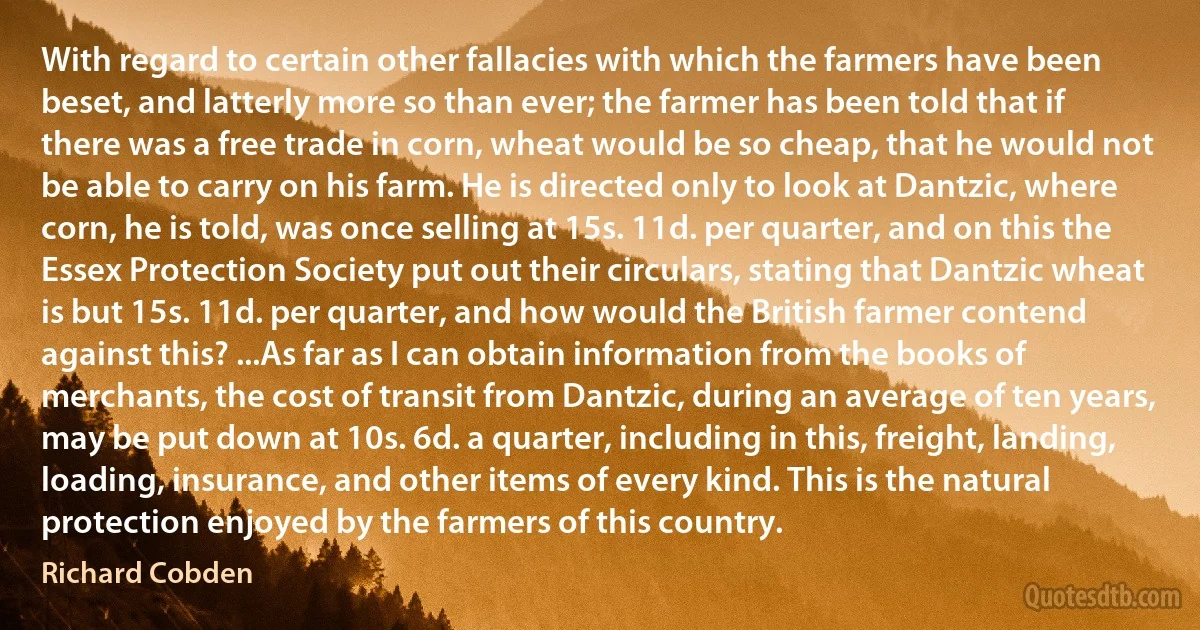
With regard to certain other fallacies with which the farmers have been beset, and latterly more so than ever; the farmer has been told that if there was a free trade in corn, wheat would be so cheap, that he would not be able to carry on his farm. He is directed only to look at Dantzic, where corn, he is told, was once selling at 15s. 11d. per quarter, and on this the Essex Protection Society put out their circulars, stating that Dantzic wheat is but 15s. 11d. per quarter, and how would the British farmer contend against this? ...As far as I can obtain information from the books of merchants, the cost of transit from Dantzic, during an average of ten years, may be put down at 10s. 6d. a quarter, including in this, freight, landing, loading, insurance, and other items of every kind. This is the natural protection enjoyed by the farmers of this country.
Richard CobdenRelated topics
able carry certain cheap corn cost country far farm farmer free kind natural once selling stating tell ten trade transit wheat years essexRelated quotes
Dear Sir, - I have truly, I must say, written three times, and now hesitate; for did I know your son's works, or, as you say, his gifted merits yet even then I would rather advise you to think well, and not be carried away by the admiration which any friendly hopes (which ardent friends to early talent) may assume: they know not the difficulties or the necessities of the culture of the Fine Arts generally speaking. In regard to yourself, it is you alone can judge how far you are inclined to support him during perhaps a long period of expense; and particularly if you look towards tuition, the more so; for it cannot insure success (however much it may facilitate practice), and therefore it behooves you to weigh well the means in your power before you embark in a profession which requires more care, assiduity, and perseverance than any person can guarantee.

J. M. W. Turner
My guess is that well over eighty per cent of the human race goes through life without ever having a single original thought. That is to say, they never think anything that has not been thought before, and by thousands.
A society made up of individuals who were all capable of original thought would probably be unendurable. The pressure of ideas would simply drive it frantic. The normal human society is very little troubled by them. Whenever a new one appears the average man displays signs of dismay and resentment. The only way he can take in such a new idea is by translating it crudely into terms of more familiar ideas. That translation is one of the chief functions of politicians, not to mention journalists. They devote themselves largely to debasing the ideas launched by their betters. This debasement is intellectually reprehensible, but probably necessary to carry on the business of the world.

H. L. Mencken
No sooner was the Baltic open to our merchants, than corn was bought up there for importation into England; at the same time the continent was glutted with English goods, which, because the supply greatly exceeded the demand, were sold at less than their prime cost, and upon which the foreign governments soon laid new duties...to prevent the ruin of their own manufactures. This might have been a salutary lesson, if nations were ever rendered wise by experience; it might have taught us that, however willing one part of this nation might be to see the other ruined by the free admission of foreign grain, foreign governments would never consent to have their fabrics destroyed by the unrestricted introduction of British goods. It is a sound maxim in politics, whatever it may be in morals, that charity begins at home.

Robert Southey
What is the good, I ask, in the name of common sense, of prohibiting sweating in this country if you allow sweated goods to come in from foreign countries? If you insist on limitation, of hours and upon precautions for security, bear in mind all these things add to the cost of production, to the difficulties of the manufacturer in selling his goods, and unless you give him some increased price, some increased advantage in compensation, then he cannot carry on competition any longer. All these conditions in the long run will result not to your advantage, for you will have no work to do, but to the advantage of the foreigner, who is not so scrupulous and who conducts his work without any of these conditions...If protected labour is good, and I think in many ways it is...then it is good to protect the results of labour, and you cannot do one without the other.

Joseph Chamberlain
...what is the constitutional bearing of these stipulations? ...It is perfectly monstrous...It means that we abandon our fiscal independence, together with our free-trade ways; that we subside into the tenth part of a Vehmgericht which is to direct us what sugar is to be countervailed, at what rate per cent. we are to countervail it, how much is to be put on for the bounty, and how much for the tariff being in excess of the convention tariff; and this being the established order of things, the British Chancellor of the Exchequer in his robes obeys the orders that he receives from this foreign convention, in which the Britisher is only one out of ten, and the House of Commons humbly submits to the whole transaction. ("Shame.") Sir, of all the insane schemes ever offered to a free country as a boon this is surely the maddest.

Henry Campbell-Bannerman
